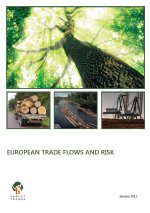European Trade Flows and Risk
By Rupert Oliver, Kerstin Canby - Forest Industries Intelligence Limited, Forest Trends View PublicationIllegal logging, as defined in the EU Timber Regulation (EUTR), is the harvesting of timber in contravention of the laws and regulations of the country of harvest. Illegal logging is a global epidemic with significant negative economic, environmental and social impacts. Recent studies indicate that illegal logging accounts for 50–90 percent of the volume of all timber production in key producer tropical countries in the Amazon Basin, Central Africa, and Southeast Asia, and 15–30 per cent globally.
In economic terms illegal logging results in lost revenues from taxes and other duties that could be used by producer countries for sustainable development purposes and other benefits. In environmental terms illegal logging is associated with deforestation, water pollution, spread of disease, climate change and a loss of biodiversity due to habitat destruction. In social terms illegal logging can be linked to conflicts over land and other resources, the disempowerment of local and indigenous communities, the loss of lives and livelihoods, human rights violations, corruption, and armed conflicts. Illegal logging also undermines international security, supports organized crime and money laundering activities, and leads to unfair competition in the marketplace that negatively impacts the sincere efforts of responsible operators in Europe and other regions of the world to comply with the law.

